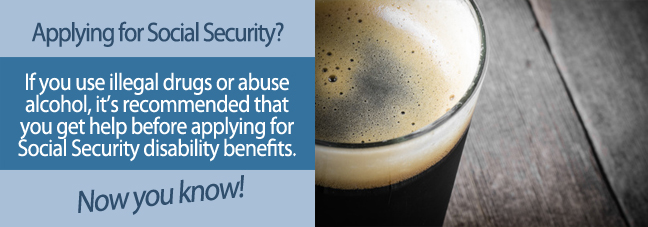Do I have to pass a drug test in order to receive benefits?
Although the Social Security Administration (SSA) has no drug testing policy for disability benefits, drug or alcohol use or abuse can certainly affect your mental or physical impairment as well as your disability claim.
In some instances, use or abuse of controlled or illegal substances can cause your application to be denied. In others, the SSA may view a history of substance use as a symptom of a mental or psychological disability.
No matter how the SSA views drug or alcohol use however, spending your limited disability payments on drugs or alcohol isn’t just impractical. It may be illegal too. It therefore not only puts you at risk for losing your disability benefits, but may also make you criminally liable.

Discovery of Drug and Alcohol Use During the Disability Review
In the disability application, the SSA poses questions about drug and alcohol use. If you’re required to attend a consultative exam as part of the disability review, the contracted physician that examines you may also ask questions about current or past substance use or abuse.
Even though the SSA doesn’t test for drugs or alcohol, there are other means by which your use of controlled or illegal substances can be discovered. After all, you must give the SSA access to your medical records, which may include blood and urine test results and notes from your doctors, mentioning previous responses to drug- or alcohol-related questions. Other tests results in your records may also point to a history of substance use or abuse, like liver or kidney function tests.
Disability Approval or Denial and Drug or Alcohol Use
When you apply for benefits, you commit to being honest in your application and all other interactions with the SSA and its representatives. Even if you do not disclose substance use, the SSA may discover it, and if they find you were dishonest, you can be denied benefits on that fact alone.
In some cases, drug or alcohol use is part of a disabling condition. For example, many individuals with mental illnesses self-medicate with drugs or alcohol. That being said, even in cases like these, current use can cause a claim to be denied, particularly if the applicant wouldn’t be disabled if it weren’t for the use of a controlled or illegal substance.
Getting Help with Your Disability Claim
Understanding exactly how to handle questions of drug or alcohol use can be difficult, but a disability attorney or advocate can help. He or she can advise you on how and when to disclose details of past or current substance use. If you’re initially denied benefits, an advocate or attorney can help you file an appeal and argue your disability case at the appeal hearing as well.